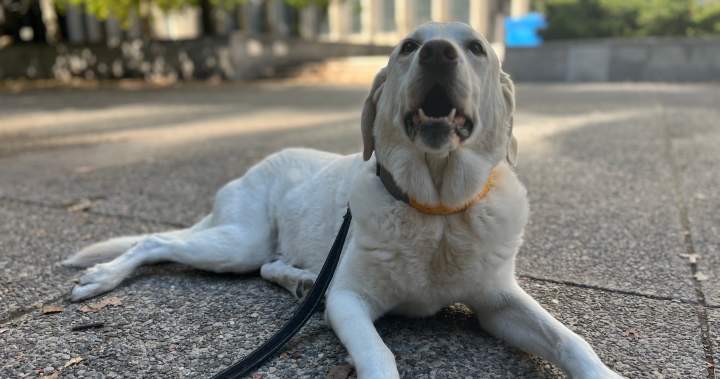In an emotional legal dispute that has captured Toronto’s attention, the custody of a beloved trauma support dog now rests in the hands of the courts. Rip, a four-year-old black Labrador retriever who has provided comfort to countless trauma survivors, has become the center of an increasingly contentious battle between two organizations claiming ownership rights.
The dispute erupted after Rip’s handler, Rebecca Smith, left her position at Toronto Crisis Response (TCR) to join Healing Paws, a competing trauma support organization. Smith insists she was given permission to take Rip with her, citing the deep bond formed during their three years working together.
“Rip isn’t just a service animal—he’s my partner in helping people through their darkest moments,” Smith told me during an interview outside the courthouse yesterday. “We’ve developed an intuitive connection that allows him to sense exactly when someone needs comfort. Breaking that bond would be devastating not only for me but for the trauma survivors who depend on his unique abilities.”
Toronto Crisis Response, however, maintains that Rip belongs exclusively to their organization. Court documents show TCR invested approximately $25,000 in Rip’s specialized training and certification, arguing this substantial investment grants them clear ownership rights.
“While we understand the emotional attachment that develops between handlers and support animals, our primary concern must be ensuring Rip continues serving the community as intended,” said Michael Chen, TCR’s executive director. “Our organization raised funds specifically for Rip’s training to serve Toronto’s trauma survivors.”
The case highlights a growing legal question in the field of trauma support services—where does ownership lie when service animals form deep psychological bonds with their handlers? According to legal expert Catherine Williams, professor of animal law at the University of Toronto, these cases exist in a complicated gray area.
“Unlike typical property disputes, trauma dogs serve a critical psychological function that complicates traditional ownership claims,” Williams explained. “Courts increasingly recognize the unique bond between handler and animal as a factor in these determinations, alongside financial investments and contractual obligations.”
As the court proceedings unfold, those who have benefited from Rip’s services have begun speaking out. Survivor advocacy groups have submitted letters to the court emphasizing the dog’s remarkable impact on trauma recovery. Sarah Johnson, who received Rip’s support after surviving a violent crime in 2022, described his intuitive ability to provide comfort during overwhelming moments.
“During my testimony, Rip sensed exactly when I was about to break down,” Johnson recalled. “He placed his head on my lap at the precise moment I needed him most. That kind of intuitive connection can’t be manufactured or trained—it develops through consistent partnership.”
The dispute raises important questions about the rapidly evolving field of trauma support animals. With increasing recognition of their effectiveness, organizations across Canada have invested heavily in specialized service dogs, yet the legal framework governing their ownership remains underdeveloped.
As Toronto awaits the court’s decision, expected next month, the case may establish an important precedent for similar disputes nationwide. For now, Rip remains with Smith under a temporary arrangement while continuing to provide support services through Healing Paws.
In a city where trauma support resources are already stretched thin, the ultimate question remains: how can this dispute be resolved in a way that best serves those who need Rip’s unique abilities most? As our understanding of trauma recovery evolves, perhaps our legal frameworks must evolve alongside it.
















